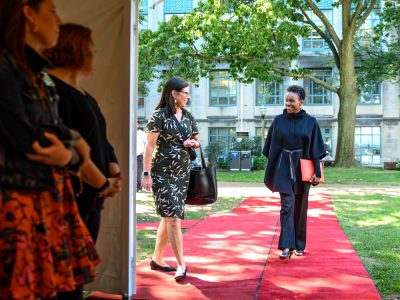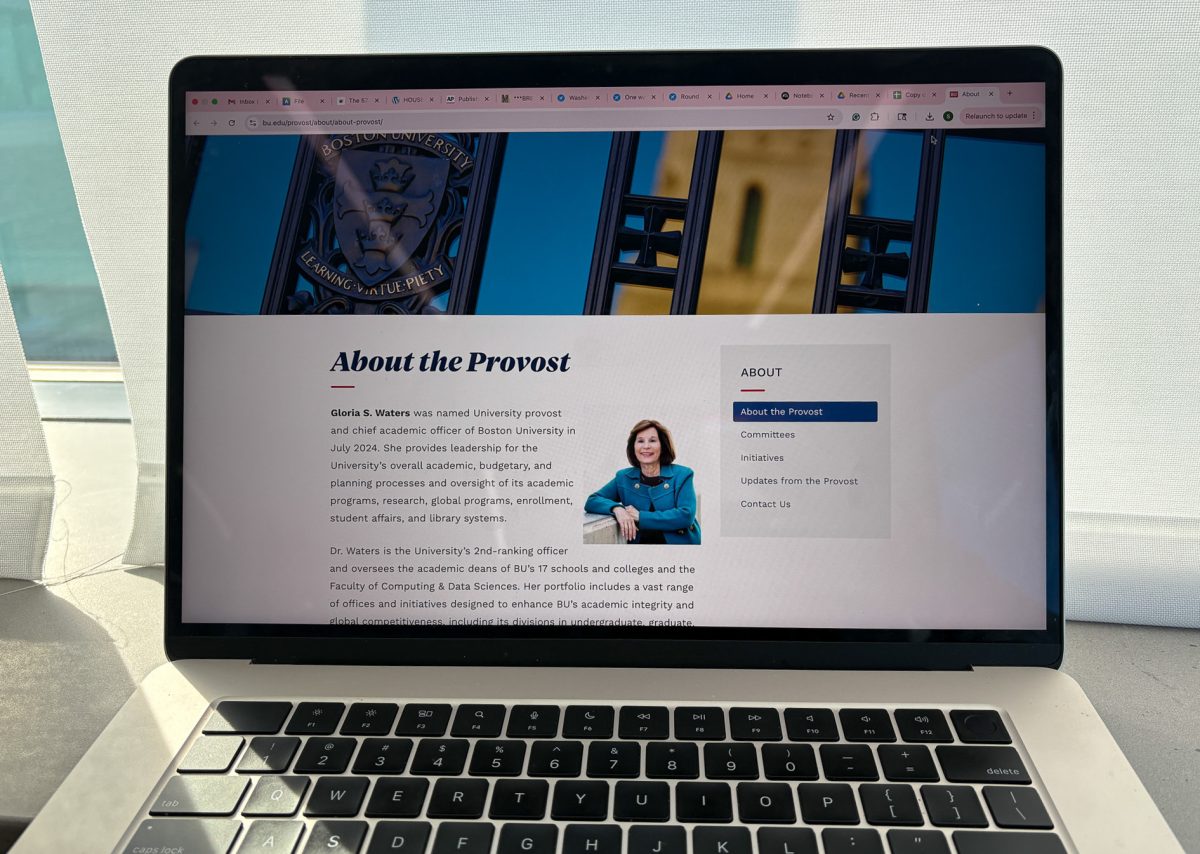Boston University faculty and professors welcomed the newly-announced future president, Melissa Gilliam, whose appointment was made public Wednesday morning.

Dean of Students Jason Campbell-Foster said he was “thrilled” with the announcement of Gilliam as president.
“I couldn’t think of a better person to step in and lead us into the next chapter then Dr. Gilliam,” Campbell-Foster said. “I’m excited about the opportunity to work alongside her and learn from her and allow her to understand better the student experience.”
This sentiment is shared amongst top university administrators like interim President Kenneth Freeman, who will remain in his current role until the end of the academic year.
“Boston University has a bright future. I am very confident we will continue to advance as an institution under Dr. Gilliam’s leadership,” Freeman wrote in a statement to The Daily Free Press. “We are already working to ensure a seamless transition.”
Mariette DiChristina, dean of the College of Communication, expressed her admiration of Gilliam.
“I think in Dr. Gilliam we really have the epitome of a caring, multidisciplinary person which is just exactly the right fit for Boston University,” DiChristina said.
Gilliam is the first woman and the first Black president of the University, characteristics professors like Tina McDuffie, professor of the Practice of Broadcast Journalism, noticed.
“I think the impact of having a first black and first woman president is that everyone feels, or people who maybe haven’t felt represented, feel that they have some representation,” said McDuffie, advisor for BUTV. “I would hope that people from all different facets of life look at this University and feel like they can be a part of Boston University.”
Rachel Brulé, assistant professor of Global Development Policy, said the University was “far later” than they should be to appoint an African American and woman President, but is glad Gilliam has taken on the role of being this “trailblazer.”
“There is a lot of really important research and policy that’s happening [at BU],” said Brulé.“I’m really excited to see how Dr. Gilliam engages on all these fronts and I am really excited to see her magnify the voices of all the people who are engaged in sustaining fundamental transformation.”
Geoffrey Poister, associate professor of Film and Television in COM, said in order for diversity and compassion to be seen in society Boston University needs the “leadership of our educational institutions to reflect that.”
“An institution the size of a major university has the opportunity to be a role model,” Poister said. “Having a president who represents diversity and achievement and has a track record of really putting compassion into use gives Boston University a chance to be something that people can look up to.”
Tereasa Brainerd, a professor of Astronomy since 1995 and interim associate dean for Undergraduate Academic Programs and Policies in the College of Arts and Sciences, echoed this sentiment in an email, stating that while the word “historic” is used casually, in this case this appointment is “nothing short of historic.”
“[Gilliam’s] appointment sends a clear message … that, as an institution, we are deeply committed to ‘traditional’ university values, as well deeply committed to fostering and growing a diverse scholarly community with diverse leaders at the very pinnacle of leadership,” Brainerd wrote.
Professors in COM took note of Gilliam’s accomplishments as well as the accomplishments of her mother, Dorothy Butler Gilliam, who was the first Black woman reporter to work at the Washington Post.
Brian McGrory, chair of the Journalism Department, said Gilliam is “hyper-qualified.”
“If you conjured the idea of a perfect president in this day and age for BU, that might well be her,” McGrory said. “I would have endless faith in anybody who was raised by a journalist as accomplished as her mother.”
Gilliam’s appointment as president will follow the term of President Robert Brown, who served as the BU President for 18 years.
“I expect the transition will be smooth,” Brainerd wrote. “When Dr. Gilliam arrives at BU, she will receive tremendous amounts of support from the university leadership, all of whom are no doubt incredibly excited to work with her and to assist her with implementing her vision for the future.”
DiChristina took note of how former presidents “pass the baton” of leadership to each other and said she thinks the university has set up the exchange of leadership for Gilliam “perfectly.”
“I can’t help but be impressed at the way each leader has both paved the way but also help[ed] support the leader after them,” DiChristina said.
Prior to her career at BU, Gilliam worked at The Ohio State University as Executive Vice President and Provost and at University of Chicago as the Ellen H. Block Professor of Health Justice and Vice Provost.
Her former colleague, Wendy Smooth, described Gilliam as “tenacious.”
“Working with her is infectious,” Smooth said. “You want to do more, she’s doing more and you’re going to want to do more to match that tenacity.”
Smooth works as Senior Vice Provost for Inclusive Excellence at Ohio State, a position that “came into existence” when Gilliam joined the university. Smooth was also part of Gilliam’s senior leadership team.
“She felt very strongly about the need to have someone who could oversee the university’s strategic vision around inclusion and what it means to allow every faculty, staff and student to feel as if they are a part of the institution,” Smooth said.
Gilliam will be inaugurated into BU as the president on Jan. 1, 2024, and will begin her duties as president on July 1.
“As President-Elect, Gilliam said herself, she’s not starting until July 1, but until then, she is going to continue her journey of learning about us at BU so that when she does take the helm formally, she’s going to be ideally positioned to succeed,” DiChristina said.
Poister reinforced the idea that Boston University should set an example for diversity.
“It starts at the top. I think actions and physical presence are more important than words,” Poister said. “A lot of people can talk endlessly about diversity and building community, but you need somebody who is able to show that. I think this new President gives us a chance for that to happen.”
Sydney Topf contributed to the reporting of this article.
























































































































